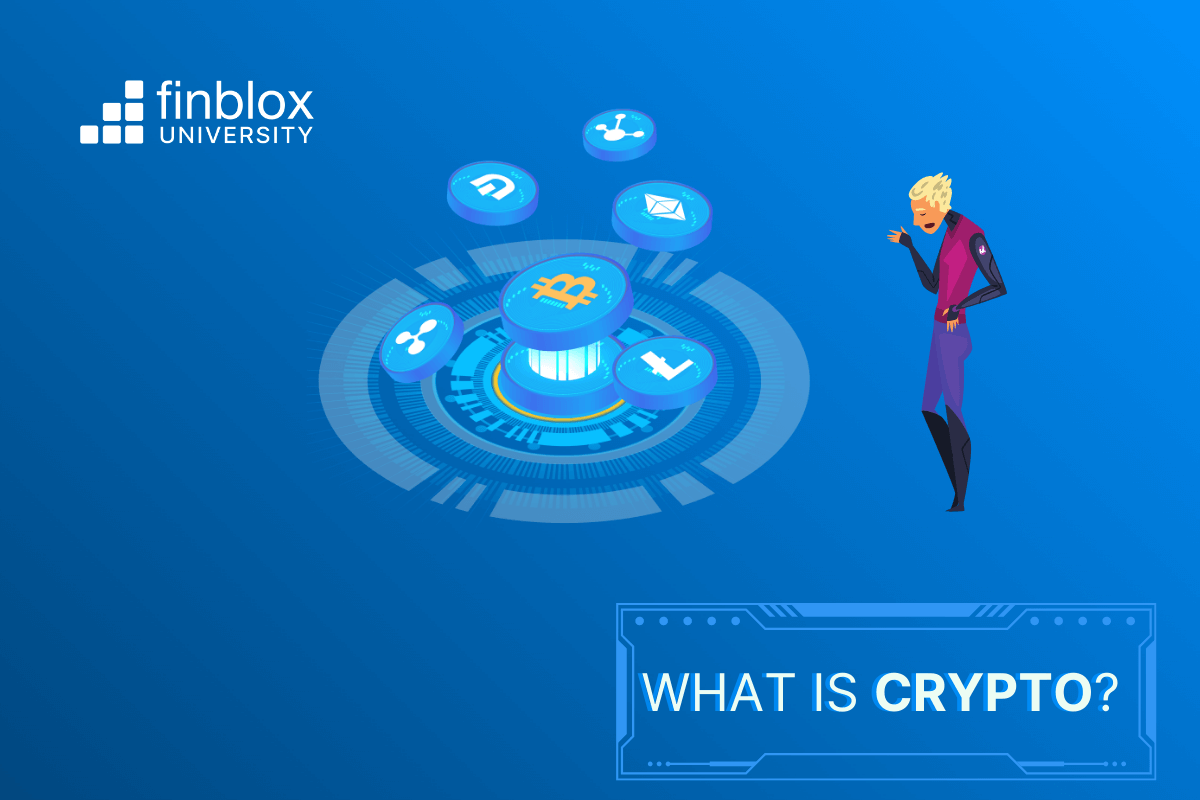Learn everything you need to know about crypto in simple terms! We cover the fundamentals, advantages, disadvantages, and where to obtain crypto.
Cryptocurrencies are digital currencies that exist only in the virtual world, and have no real-world equivalent. All cryptocurrency transactions are recorded and executed on a blockchain - a vast network of computer systems that can store any kind of data using a distributed ledger model.
That's quite a mouthful, isn't it? To put things simply, a ledger is a place where we record data. A centralized ledger means all of this data is in one place - while a distributed ledger means that this data is stored in different places.
Imagine you were a hacker - and you gained access to a computer that held credentials to all of the bank accounts in the world. It would be devastating to be able to steal so much from a single point of access - and yet this is how most companies and institutions store their data!
Now imagine you were that same hacker, but had to gain access to 10,000 computers to put together the credentials. And to spice things up - all 10,000 computers are watching and communicating with each other to make sure no suspicious activity is happening out of the blue. You would have to crack all of them simultaneously to ensure no witnesses!
That is how the blockchain works - distributing data across computers in the network so that they can verify each others' transactions, but also not sharing every bit of data in the ledger to any one computer - which would make it susceptible to a hack.
For this reason, crypto, blockchain, and distributed ledgers are known as decentralized technologies.
How does crypto differ from traditional currencies?
Traditional currencies are known as fiat money - physical currencies with value that is backed and determined by a governing body. It is commonly found in the form of paper bills and coins.
Fiat money is not to be confused with representative money, which is a special class of fiat money backed by a physical commodity such as gold or silver. Recent arguments have claimed that the dollar is a better store of value than crypto because of its representative value; however it has not been backed by gold since 1971.
Instead, it is backed by "the full faith and credit of the US government." What does this mean? Essentially, it means the dollar is worth whatever the US government and the rest of the world decides it is worth. This is hardly any different from crypto, whose value is decided by the community and investors instead.
To summarize, fiat money:
- Has value assigned by a governing body
- Is vulnerable to inflation from overprinting money, rising interest rates, and other factors
- Can sometimes be insured to a certain extent in the event of loss (i.e., FDIC)
- Is overseen by a central authority in all transactions
Meanwhile, crypto:
- Has value assigned by the community and its investors
- Is highly-resistant to inflation because of how quickly it grows in value compared to depreciation, and is not subject to the economic performance of any one country or government
- Is not usually insured in the event of loss, unless insurance is purchased
- Transactions require no supervision from authorities, other than the computers in the network. Because the data does not lie, transacting parties do not need to trust each other and this is known as a trustless protocol.

How can I take advantage of crypto?
The nature of the blockchain is what makes cryptocurrency so appealing to ordinary people and investors. Remember how we talked about the blockchain being trustless, and how it doesn't require a central authority to review all transactions?
Well, think about the role of banks and financial institutions in your daily life. Banks are able to charge you fees for their services because they hold your money and carry out the paperwork and due diligence review every time money comes in or goes out of your account.
But banks also have their fair share of weaknesses. They can't run 24/7, and have a hierarchy of information that passes inefficiently between humans and computers - sometimes taking several days to weeks to process a transfer. Foreign exchange rates place some currencies at a disadvantage, and international transfer limits prevent you from moving your money where you need it the most. Last but not least is inflation, which outpaces even the highest bank interest rates every year.
By storing your money in crypto and using it for transactions, you can:
- Cut out the middleman and pay substantially less fees
- Process transactions extremely quickly without human intervention
- Process transactions privately and securely due to the encryption of the blockchain
- Access your money wherever and whenever you need it in the world, without fear of foreign currency fluctuations in value
What should I be careful of when it comes to crypto?
Crypto is extremely volatile - there's no denying this fact. And the ease with which it can be accessed by new and inexperienced investors has only added to its notorious reputation, following their failures and horror stories.
However, it's fair to note that its short-term volatility has not prevented crypto from achieving astronomical growth rates in the long-term. Within the span of one to a few years, most of the top 100 cryptos have grown several hundreds if not thousands of percentage points. Short-term volatility is misleading and should not be the main cause of concern for investors who intend on holding long-term.
This potential for massive long-term gains has created an interesting case for crypto savings accounts, which we will discuss later.
Cybersecurity has been cited as another concern for crypto, with a record-breaking 14 billion dollars of crypto reported stolen in 2021. Yet in December of the same year, nearly 100 billion dollars in Covid relief funds were stolen and rerouted through traditional finance systems - and this accounts for only one heist. Trillions of dollars are lost every year to cybercrime, thanks to the vulnerability of existing transaction methods and systems. Banks and institutions have done very well in concealing the amount of money that has disappeared under their watch to preserve public credibility - but this is a facade that cannot be maintained for long.
Crypto communities are rife with scams, so you should take caution in believing anything that seems too good to be true. Most scams will ask you to send crypto to an address, in promises that they will send you back "double the amount" or a generous return. Some will ask for your credentials, or attempt to steal your information through a fake version of an official website where you would log in. Whatever the case - never give out your account information or private keys to anyone that is not verified to handle your account.
Unfortunately, the same level of encryption and security that makes crypto nearly unhackable can prove to be a double-edged sword to users. Because the blockchain is immutable, and data cannot be altered once entered - it is a one-way street. Your unique address that represents your crypto account (a wallet) will always be the same string of characters, and transactions move in one direction until they are received...or never received. As a result:
- Losing your personal wallet credentials means you will never be able to send or retrieve funds from that account again. The credentials can be recovered with a recovery phrase - but if you lose that too, it's game over.
- If you forget your credentials on an exchange, it is a little more forgiving since they manage your information - but the recovery process can still be extensive.
- Sending crypto to the wrong wallet address is irreversible.
- Sending crypto to a non-existent address will result in it being burned - or lost forever.
Therefore, all crypto transactions and account information should be managed with extreme attention to detail.

How can I get crypto?
You can obtain crypto in three primary ways:
- Mining it
- Receiving it in transactions or as an incentive
- Buying it on centralized and decentralized exchanges
For the purposes of keeping things simple, we will talk about mining in a separate article as it is unlikely to apply to ordinary people and investors. There are also numerous reasons why someone might receive crypto as an incentive - such as a reward for staking or yield farming. These are advanced concepts that can be discussed later.
Buying crypto on an exchange is by far the most common way to obtain it - and these exchanges are run very similarly to stock exchanges. The main difference between a centralized and decentralized exchange is that the former is A) regulated and B) managed by a central entity that ensures the integrity of the exchange and every user on it.
The latter is difficult to regulate because it is run by users on the network without interference of outside parties. These are direct peer-to-peer transactions that move crypto from private wallet to private wallet. Because decentralized exchanges are difficult to regulate and supervise, they are very popular in markets where crypto has been banned.
The Takeaway:
Cryptocurrency and blockchain technology are groundbreaking because they represent a highly secure and private store of value that can protect against inflation, expedite transactions to anywhere in the world, and reduce fees by being completely autonomous.
However, crypto is highly volatile for the short-term investor and may not be suitable for users who are A) less vigilant with their accounts and B) prefer extensive customer service. For this reason, we offer a reliable crypto earnings platform for users who prefer peace of mind while still enjoying long-term gains.
Thanks for reading! Please subscribe if you haven't already, and stay tuned for more detailed information on the structure of the blockchain!
This content is provided for informational purposes only, and should not be relied upon as legal, business, investment, or tax advice. You should consult your own advisers as to those matters. Charts, graphs and references to any digital assets are for informational and illustrative purposes only.



